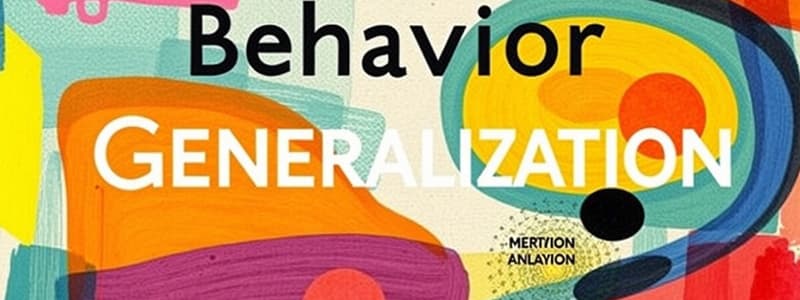Podcast
Questions and Answers
What are the components of generality of behavior change?
What are the components of generality of behavior change?
What is stimulus generalization?
What is stimulus generalization?
The target behavior occurs in all relevant circumstances and outside of the training session.
What does response generalization involve?
What does response generalization involve?
Change in the target behavior results in change in other relevant behaviors.
What is meant by maintenance in behavior change?
What is meant by maintenance in behavior change?
Signup and view all the answers
Which of the following are examples of promoting generalization?
Which of the following are examples of promoting generalization?
Signup and view all the answers
What should be considered when planning for generalizing behavior change?
What should be considered when planning for generalizing behavior change?
Signup and view all the answers
What strategies can be used to promote generalization?
What strategies can be used to promote generalization?
Signup and view all the answers
Why is reinforcing instances of generalization important?
Why is reinforcing instances of generalization important?
Signup and view all the answers
How can skills that contact natural contingencies of reinforcement be taught?
How can skills that contact natural contingencies of reinforcement be taught?
Signup and view all the answers
What is the goal of modifying contingencies of reinforcement and punishment in the natural environment?
What is the goal of modifying contingencies of reinforcement and punishment in the natural environment?
Signup and view all the answers
What does incorporating a variety of relevant stimulus situations in training aim to achieve?
What does incorporating a variety of relevant stimulus situations in training aim to achieve?
Signup and view all the answers
What role do common stimuli play in the generalization process?
What role do common stimuli play in the generalization process?
Signup and view all the answers
How does teaching a range of functionally equivalent responses help generalization?
How does teaching a range of functionally equivalent responses help generalization?
Signup and view all the answers
What is the importance of providing cues in the natural environment?
What is the importance of providing cues in the natural environment?
Signup and view all the answers
What are self-generated mediators of generalization?
What are self-generated mediators of generalization?
Signup and view all the answers
What categories of generalization strategies exist?
What categories of generalization strategies exist?
Signup and view all the answers
What do procedures focused on reinforcement contingencies involve?
What do procedures focused on reinforcement contingencies involve?
Signup and view all the answers
What constitutes procedures focused on stimulus control?
What constitutes procedures focused on stimulus control?
Signup and view all the answers
What do the procedures focused on functional equivalence entail?
What do the procedures focused on functional equivalence entail?
Signup and view all the answers
What guidelines should be followed for prompting generalization?
What guidelines should be followed for prompting generalization?
Signup and view all the answers
What is in situ assessment?
What is in situ assessment?
Signup and view all the answers
What are the indicators of successful treatment for problem behaviors?
What are the indicators of successful treatment for problem behaviors?
Signup and view all the answers
What guidelines are essential for achieving generalized reductions in problem behaviors?
What guidelines are essential for achieving generalized reductions in problem behaviors?
Signup and view all the answers
Study Notes
Generality of Behavior Change
- Comprises stimulus generalization, response generalization, and maintenance.
- Ensures behavior changes are applicable across different settings and over time.
Stimulus Generalization
- Occurrence of target behavior in various relevant circumstances.
- Target behavior extends beyond training sessions.
Response Generalization
- Change in the target behavior leads to alterations in other relevant behaviors.
Maintenance
- Continued occurrence of the target behavior in relevant situations after training ends.
Examples of Promoting Generalization
- Teaching assertiveness skills, enhancing social skills in children with autism, and soccer offensive strategies.
Planning for Generalizing Behavior Change
- Identify naturally occurring contingencies and list behaviors needing change.
- Determine settings and situations where target behaviors should or shouldn't occur.
Strategies to Promote Generalization
- Reinforce instances of generalization and train skills that align with natural reinforcement contingencies.
- Modify reinforcement and punishment in natural environments.
- Use diverse relevant stimulus situations in training and incorporate common stimuli.
- Teach a variety of functionally equivalent responses and provide cues in natural environments.
- Use self-generated mediators to aid in generalization.
Reinforcing Instances of Generalization
- Conduct training in the target situation with alignment between training and natural environments.
Training Skills for Natural Contingencies
- Analyze natural contingencies, train effective skills for learners, and equip learners to solicit reinforcement.
Modifying Natural Contingencies
- Gain control over natural reinforcement and punishment settings, especially in educational or residential contexts.
Variety of Relevant Stimulus Situations
- Sample all relevant discriminative stimuli (SDs) and use general case programming by training a broad range of exemplars.
Incorporating Common Stimuli
- Ensure training stimuli have control over target behavior in natural environments; may involve people or physical aspects.
Teaching Functionally Equivalent Responses
- Increases the likelihood of adaptive responses in new or challenging situations.
Providing Cues in Natural Environment
- Recruit others to offer prompts, which may involve response or stimulus prompts.
Self-Generated Mediators of Generalization
- Encourage behaviors like self-instructions to generate personal cues or prompts.
Categories of Generalization Strategies
- Focus on reinforcement contingencies, stimulus control, and functional equivalence.
Procedures Focused on Reinforcement Contingencies
- Include reinforcing generalization instances, training relevant skills, and modifying natural reinforcement environments.
Procedures Focused on Stimulus Control
- Incorporate varied stimulus situations, common stimuli, cues, and self-generated mediators.
Procedures Focused on Functional Equivalence
- Emphasize teaching various functionally equivalent responses.
Guidelines for Prompting Generalization
- Identify target skills, contexts for skills, training methods, settings for training, strategies to promote generalization, and assessment methods.
In Situ Assessment
- Evaluate skills in natural settings covertly for accurate measurement of generalization.
Indicators of Successful Treatment for Problem Behaviors
- Reduction of problem behaviors, increased desirable alternatives, behavior change generalization, and enhanced quality or quantity of positive reinforcement.
Guidelines for Generalized Reductions in Problem Behaviors
- Implement functional assessments, functional interventions, advance planning for generalization, focus on alternative behaviors, and maintain consistent extinction or punishment across various situations.
Studying That Suits You
Use AI to generate personalized quizzes and flashcards to suit your learning preferences.
Description
This quiz focuses on essential concepts related to the generalization of behavior change in Applied Behavior Analysis (ABA). Key terms such as stimulus and response generalization are explored, along with their definitions. Perfect for students preparing for their ABA final exam.




